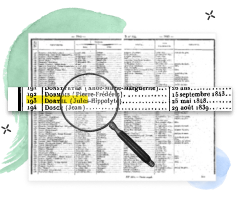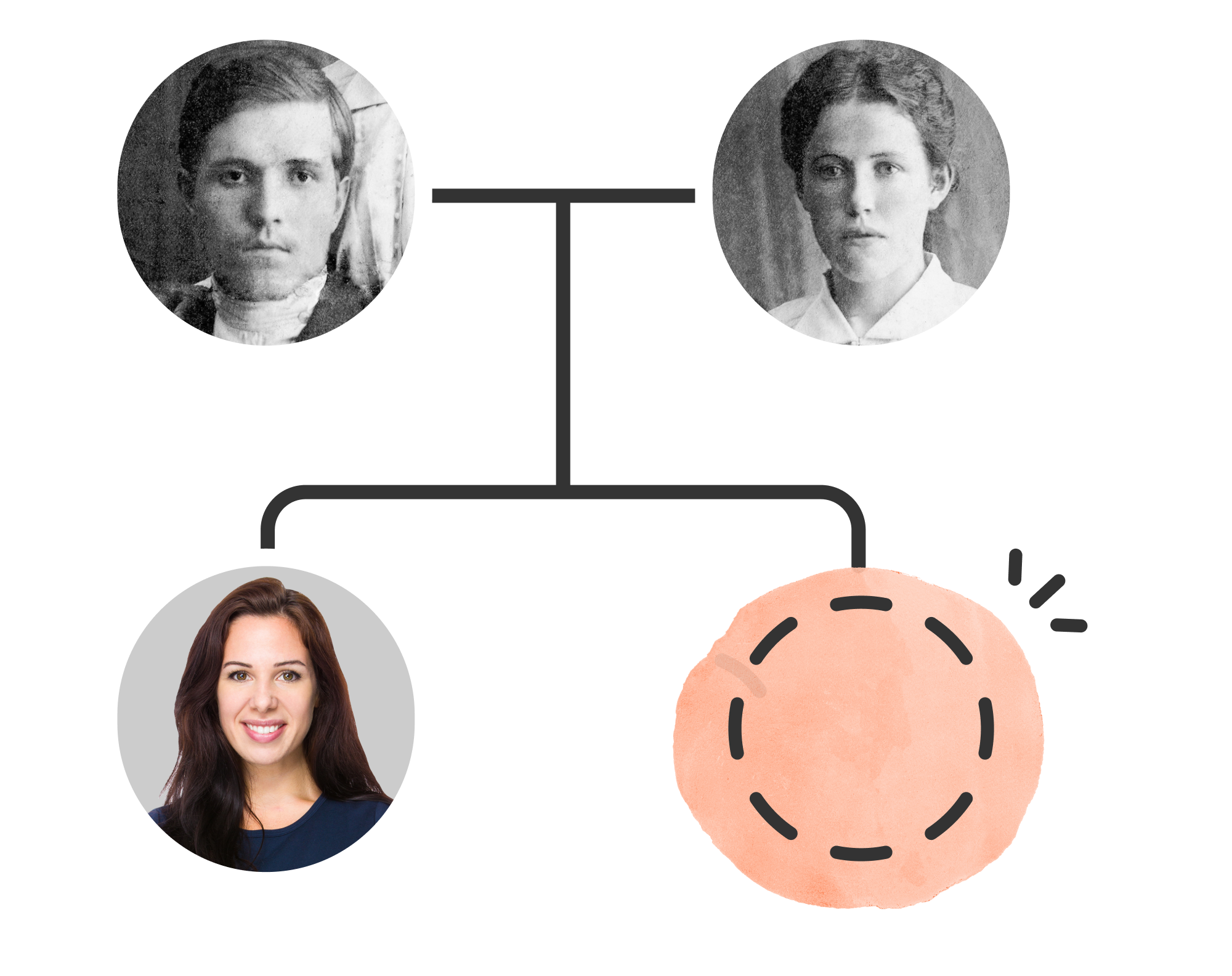
Tracing the origin of your last name, or surname, is a basic investigation that many people want to undertake. There’s good reason for this. Surnames are woven into the fabric of human history. They reflect societal evolution and are an important way to preserve cultural heritage. Surnames record each person’s status and identity within their community while also capturing their family lineage. More generally understanding surnames and their many different conventions helps us appreciate the diversity and complexity of human societies.
Research your ancestors on MyHeritage
Surname origins
Surnames have fascinating origins that span centuries and vary enormously around the world and over time. Ancient civilizations, such as those in Egypt, Greece and Rome all had well established and distinct naming systems. They were rich in symbolism, reflecting aspects of a person’s life or identity through the lens of that society’s own values and religious beliefs. Sometimes names even incorporated references to their deities. But these ancient naming conventions bore little resemblance to the modern concept of a surname.
The method of identifying families and individuals in other parts of the ancient world across Africa, Asia, the Pacific and the Americas is only imperfectly understood. The written scripts of some languages that may have represented individual or family names are yet to be fully deciphered. In other cultures names were created and passed on through oral traditions, now lost, rather than in the written word.
Surname conventions
The use of family names across Western civilization evolved over the first few centuries of the second millennium of the modern era, beginning around the 11th century.
Initially surnames were mainly the preserve of aristocratic families and people in major cities. But over time they spread down to all classes and all areas.This process followed a broadly similar pattern of development across Western societies in Europe, North America and English-speaking Oceania. In these countries surnames became standard, placed after first (given) names and passed down from generation to generation through the father’s line[1].
But there are also many other surname conventions. Both the order of names and how surnames are constructed can vary around the world, based local cultural norms and traditions. For example:
- In China the surname comes before the given name(s). They are often a single syllable, such as Wang, Li, Zhang, and Liu.
- Japanese surnames only became common outside the aristocracy in the mid-19th century. They precede given names, although confusingly, in modern written media they can be re-ordered to the Western style of first given name, then surname. On marriage couples chose which surname to use, although in almost all cases it is the woman who gives up her last name. Almost uniquely in the world Japanese law mandates that both spouses to use the same surname.
- Vietnamese surnames have roots in Chinese influence, with names often based on the father's given name or characteristics. These names generally consist of the father’s family name, a middle name (which may be taken from the mother's family name), and a given name, in that order. Modern Vietnamese surnames are unusually concentrated, with only around 1,000 in common use and one, Nguyen, being used by about 40% of the population.
- Korean names typically consist of a one-syllable family name followed by a two-syllable given name. Korean siblings and cousins often share the second part of their given names.
Surname patterns

A starting point for tracing the origin of a particular surname is to consider whether it fits into one of the one of the common patterns.[2]
- Prefixes and Suffixes can provide a clue to a surname’s origin. Well-known examples are prefixes such as Mac/Mc which indicate a Scottish, Irish or Gaelic source, and the German von, meaning “of” or “from” and usually indicative of a past connection to nobility. For suffixes surname endings of -ian or -yan, for example, are likely to have an Armenian origin. In many Slav languages (Serbian, Croatian, Bosnian, Montenegrin, Slovene, Slovak, Czech, etc) the suffix ić, signifies “son of”. In Muslim culture the suffix bin or ibn has a similar meaning.
- Given names sometimes end up as last names. Thus, the given name Henry becomes the surname Harry, Harris, Hal or Halkin. Similarly, surnames like Biggs, Little, Beaver, Hogg, Partridge and many others probably come from a nickname given to an ancestor.
- The use patronymic surnames (based on the father’s name) or matronymic surnames (based on the mother’s name) is very common across many cultures. But outside Western societies the clan to which an ancestor belonged may drive a person’s modern surname rather than their paternal or maternal line. For example, in Uganda, the common surname Buganda reflects that their ancestors all belonged to this clan group. Both Fujiwara and Satōs are examples of clan-based Japanese surnames.
- Last names derive often from the occupation or profession of an ancestor. English examples include Smith, Baker, Carpenter, Taylor, Archer, Clark, Clerk and Bond. Some Jewish surnames originate from professions exclusive to Jews such as Shamash (a synagogue sexton) and Chazanian /Chazanski / Chasanov (a cantor).
- Geography is the inspiration for many surnames.
- Sometimes this is a specific location, such as a town or village associated with an ancestor. With Greek surnames, for example, a sailor from Zakynthos who settles in Pylos may be referred to as Zakynthinos by the locals. Similarly, Patrinos indicates an origin from the town of Patras, Andriotis from the island of Andros and so on.
- There are also cases where a family would add an element to their name to reflect a birthplace when moving to a new location. Polish names ending in -owski are an example of this habit.
- In other cases, last names are a nod to landmarks or physical feature relevant to an ancestor. Rockwell, Hill and Roach (from the old French word roche, meaning rock) are examples. Takahashi is a Japanese last name referencing someone who lived by, or under, a bridge.
- Even the compass can inspire surnames, like North and West, Southgate and Eastwood.
- An ancestor’s physical appearance, characteristics or achievements can translate into a last name. Surnames such Brown or Black in English or Rubio (“blonde" in Spanish) may refer to an ancestor’s hair colour, while a surname like Little might be reflect an ancestor’s diminutive stature. Surnames such as Armstrong, Brave, or Freeman may refer to some ancestor’s particularly important accomplishment or event in their life.
- Social status, especially nobility or aristocracy, is the basis of some last names. Unlike individual surnames that could change within a person’s lifetime, hereditary surnames provided stability and helped maintain family continuity, facilitated property records, and enhanced the family’s prestige. They were especially popular in western European countries. The connection of some modern surnames to past nobility is obvious in cases such as Windsor, Rothschild and Medici, but there are many other examples, usually the association of a particular noble house with the region that it once dominated. Other, non-hereditary surnames, also reflect social status. Examples include Knight or Bailey (the latter a derivative from an old word for a bailiff, or protector)
Strategies for researching surnames
As with other types of genealogical research there are some standard techniques to help you with your surname research:
- Gather information from other family members who might have knowledge about your last name. They may share stories, traditions, or historical details related to your family lineage.
- Study the family trees and profiles of other individuals with the surname you are researching. Look for patterns or clues to help you refine and focus your further research.
- Share knowledge with others investigating your surname. There are genealogical societies or one-name studies dedicated to researching specific surnames you may be able to join. One-name studies are especially popular in Britain because a national index of births, marriages and deaths in England and Wales gives researchers access to records of everyone sharing a particular name. They also can track names back to 1841 using the census undertaken each decade[3].
- Since we know that surnames evolve over time tabulate the different versions of your last name to maximise your chances of finding a positive lead.
- Consider participating in DNA surname studies if these are available. These studies look for genetic markers associated with specific surnames and can reveal patterns you might otherwise miss. But also recognize that apparent DNA connections are not always 100% reliable indicators.
Common challenges in tracing surname origins
Surname research can face a variety of challenges.
- Not all last names fit one of the patterns described above. Sometimes a surname will just be unique, with no discernible connection to any other, especially if is an artificial creation.
- Surnames often suffer from spelling variations due to regional accents, dialects or the natural evolution of languages. Transcription errors in historical records frequently occur. Written script in these records is often hard to read. Translating and interpreting records in old forms of modern languages requires expertise most people will not have. And as we track backwards an increasing proportion of ancestors will have been illiterate, so mistakes in recording their names went uncorrected. As well many historical records have been lost, damaged, or destroyed over time limiting what research can be done.
- Common surnames can make it difficult to distinguish your ancestors from others with the same name. Tracing the origin of your branch of the Smith, Jones or Brown surname won’t be easy. In some societies the use of repetitive surnames (many family groups using the same last name) is a further problem for the researcher.
- Ancestors themselves may have changed their last names, for example when migrating to a new country. A surname may have been anglicized, shortened, modified or even replaced with an entirely new, unrelated last name. This may have been driven by a desire to fit in local customs or to disguise origin or ethnicity.
None of these challenges are necessarily deal-breakers, but they highlight the need to be both patient and realistic with your surname research goals.
Explore more about how to trace the origin of your surname
In addition to the millions of individual records in its various databases and the thousands of family trees contributed by individual members MyHeritage has an extensive range of resources to help you with your surname research:
- Several Webinars including Surnames and How They Help in Family History Research, Google Search Strategies for Common Surnames, Searching for Surnames: Challenges, Pitfalls and the Downright Ridiculous, What's in a Surname: The History of Surnames and How They Help in Family History Research, Using Y DNA testing to investigate Ulster and Scottish surnames, What’s That Name? Tips for Finding Nicknames, Spelling Variants and Mangled Surnames, and An Introduction to Spanish Surnames.
- Various KnowledgeBase articles, including Making the Most of Your Irish Surname, Was Your Surname Really Changed at Ellis Island? and Greek surnames
Beyond MyHeritage there are many online resources devoted to surname research:
- The WikiHow article How to Find the Origin of your Last Name, suggests several different strategies to guide your surname research and provides examples of specific surname origins.
- Family Tree Magazine has a detailed article, How to Research What Your Last Name Means, which outlines the history of surnames and how to investigate their origin.
- FamilySearch, a free online genealogical service of the Church of Jesus Christ of Latter-day Saints, includes a good section on how to find your last name’s meaning and origin.


